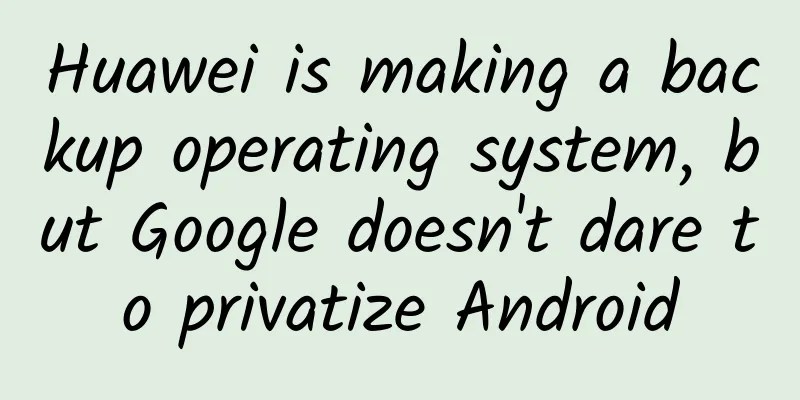Huawei is making a backup operating system, but Google doesn't dare to privatize Android

|
Recently, the news about Huawei's self-developed operating system has sparked heated discussions in the industry. In an interview with Germany's Die Welt, Huawei's Richard Yu officially admitted that "Huawei has indeed prepared a self-developed operating system, but this system is Plan B, which is designed to prevent Huawei from being unable to use Android or Windows in the future. Of course, Huawei is still more willing to cooperate with the ecosystems of Google and Microsoft." He also said that Huawei has been developing its own operating system for seven years, but it is only used as a backup to prevent being strangled at a critical moment. As early as around 2014, there were constant rumors that Huawei was going to develop an operating system. Now Huawei has finally officially announced that it has developed its own operating system. Huawei officially announced that it will develop its own operating system, but how difficult is it to succeed? Everyone knows how difficult it is to make an operating system. The difficulty is not just in technology. I have analyzed in the article "How difficult is it for Huawei to develop an operating system?" that the difficulty in developing an operating system lies in the kernel. The system kernel is a relatively complex thing, divided into many modules. The design between many modules must take into account many aspects such as scalability, software architecture design, algorithms, and code control. Therefore, in China, the OS of many domestic mobile phone manufacturers are modified based on the Android upper interface, such as Huawei's EMUI and Xiaomi's miui. They make some improvements in performance and experience based on the Android system. At most, they are Android vests, but the underlying system is still the Android kernel. In addition, the operating system requires a complete set of knowledge system frameworks, programming interfaces, programming languages and other infrastructure. Only in this way can an effective intellectual property protection system that is different from others be established. Judging from the overall current situation in China, the software industry is also dependent on Western technology systems and top-level standard designs. It does not have its own programming language and software development tools. The software industry is filling in content and designing and developing within the framework of the Western technology system. The essence of the software industry is still big but not strong, which is ultimately reflected in the gap in the operating system system. There is no successful precedent for mobile operating systems other than Android and iOS. Many systems such as Nokia's Symbian, Samsung's Tizen, Blackberry, and Microsoft's Windows Phone have already failed. Huawei has developed an independent mobile phone operating system. The most difficult part is actually getting domestic Internet giants such as BAT, Toutiao and numerous software developers to use its own operating system. Because the strength of a new operating system depends on the richness of its own application ecosystem, and the participation of leading Internet giants can have a strong driving effect . An operating system without enough applications is equivalent to an empty shell and has no value or meaning. The scale of domestic software developers is fully capable of supporting the survival of an independent operating system, but the problem is that software developers will not support a brand new operating system so unhesitatingly. After all, in the past, most software developers only supported iOS and Android, and other mobile operating systems basically failed. The root cause is that the experience and ecology of Android and iOS are already very mature. The current Android application ecosystem has become increasingly larger. In 2017, 94 billion applications were downloaded from the Google Play Store, and more than 80% of the world's smartphones are equipped with the Android system. The Android system has been used and optimized for more than ten years and has reached a very perfect level. Even if you have your own operating system, the user experience is difficult to match that of Android. To some extent, changing to a new operating system may lead to a user experience that is a step backwards from history. Therefore, if software manufacturers spend a huge amount of extra time and money to develop new software on a new operating system, but the result is an outdated user experience, it will inevitably lead to a decline in software usage reputation and user experience, which will do more harm than good to software developers. On the other hand, it is basically impossible to convince other mobile phone manufacturers to join its own operating system. Because Google launched the Android open operating system, it did not get involved in the mobile phone hardware manufacturing industry at the time, and had no direct market conflict with traditional manufacturers. It was relatively neutral, and it was natural for traditional manufacturers who lacked operating system advantages to choose the Android system. The reason why Nokia's Symbian system failed is that Nokia itself is a mobile phone manufacturer and has come into competition with other mobile phone manufacturers. Naturally, no other mobile phone manufacturers would be willing to support its operating system. If Huawei were to develop an operating system, it would face the same problem, so it can only develop a closed operating system. However, the key is how to ensure a good system experience to convince application developers to turn to it and form a software and hardware ecosystem. Therefore, it is not difficult to make an operating system. The difficulty lies in the prosperity of the application ecosystem, how to ensure the system experience of the integration of software and hardware, and how to ensure the stability and security of the system. The key issue is how to use an empty shell platform to attract more application developers to develop software. Of course, some people have also talked about the feasibility of Huawei's operating system's future development direction - it can first consider leveraging the system to open up the dedicated mobile phone market for specific groups of people (such as the military, police and political markets) or the GPS and archaeological terminal dedicated machine market. It is always better to build word of mouth in special markets and then slowly popularize the mass market than to keep it as a backup. But Huawei will not do so. On the one hand, the maturity and availability of the operating system are limited, so it dare not test the waters for the time being; on the other hand, it will affect its cooperative relationship with Google. Ultimately, Huawei's development of this operating system may be more of a strategic gesture, because there is a high probability that it will fail and there is basically no possibility of replacing Android. Huawei is not considering developing an independent system to compete with Google and Apple. Huawei knows that it does not have such strength yet. Instead, it is more about showing a gesture and strategy. That is to say, when Android starts to tighten its control, it wants to let Google know that other manufacturers still have alternative plans, and they can use their self-developed operating systems to convince Google to open up its control. Google doesn't dare to privatize Android But one thing that needs to be understood is that Huawei developed the operating system to prevent Google from privatizing Android, but Google does not actually dare to privatize Android or restrict its use to specific manufacturers. To put it bluntly, the growth and development of Android in the past was not the result of independent work by Google alone, but the result of collaborative development and efforts by upstream and downstream companies around the world . This is also the reason why Android is open source - Android cannot be considered the private property of Google alone, and Google cannot have the final say, because even the kernel of the Android system, Linux, is the result of joint development, optimization and contributions from major software and hardware manufacturers around the world. Data shows that about 15,600 developers from more than 1,400 companies have contributed to the Linux kernel since 2005. Linux is simply the mother of the Android system, and the kernel of Android is Linux. According to the 2017 report, more than 4,300 developers from more than 500 companies have contributed to the kernel. In the list of contributions to the Linux kernel in 2017, Intel ranks first, followed by Red Hat, Linaro, IBM, consultants, Samsung, SUSE, Google, AMD... Huawei is second only to Oracle. In 2017, Google contributed 3% to the Linux kernel code, while Huawei contributed 1.5%. In other words, the Android system was developed by Google through cooperation with a large number of upstream and downstream companies, establishing an open source alliance and licensing and authorization mechanism, and it was developed by continuously updating and optimizing the Linux kernel to upgrade the system. Therefore, Android is actually public in nature. As long as other manufacturers follow Android's open source agreement and open source mechanism, they can develop their own Android systems based on the open source Android - as long as they follow the license constraints of the open source Android. According to industry insiders, the main open source software licenses used by the Android system are GPL (Linux kernel), LGPL (various runtime function libraries), and Apache (Dalvik virtual machine and Java class library). Google initially joined forces with many manufacturers to develop and expand Android. If some manufacturers are restricted from using Android, it will obviously be difficult to avoid damaging the interests of other OMD manufacturers, chip manufacturers and even software developers as well as the interests of upstream and downstream companies. Based on their respective future prospects and interests, upstream and downstream companies participating in the open source alliance will also resist Google's behavior of violating the open source agreement and take certain countermeasures. At the very least, the motivation to optimize and contribute to the Linux kernel code will decrease. In other words, manufacturers will be in danger, and mobile phone manufacturers around the world may no longer dare to use Android. The result is that each of them will develop their own system or support an open source system again. This may lead to the gradual decline of Android. Simply put, if Google privatizes Android, it will encounter great resistance from manufacturers within the open source alliance on the one hand, and on the other hand, manufacturers with upstream and downstream interests will also consider working together to launch a new system that is truly public, open, and has a reasonable and open licensing mechanism to replace it. On the other hand, as the Android ecosystem continues to grow, although Google is the leader of the Android camp, it is unable to complete the development, adaptation, and distribution of the entire new Android system alone, and is increasingly dependent on partners. For example, based on the upcoming new version of Android Q, Illiyan Malchev, director of Google's Project Treble, revealed that he is currently planning to cooperate with more OEM manufacturers to optimize the development system. In other words, as the Android ecosystem grows and develops in depth, it needs to gather more and more chip suppliers, operators and OEM manufacturers to work together to break through the bottleneck. The contribution of giant manufacturers such as Samsung and Huawei is very important because the two have been deeply involved in the entire Android system from basic code to final formation. Therefore, if Google imposes restrictions on specific manufacturers, especially leading manufacturers such as Samsung and Huawei, it will itself divide its own camp, affect Android's optimization progress and new system development, and reduce its own camp's strength and market share. The importance of Android's stability and market share to Google is self-evident. If the Android camp is divided and Apple dominates the market, and if Apple blocks or restricts Google's search and other businesses on iOS based on competition, Google's core territory and profitability will suffer severe damage. Simply put, the growth of Android's market share has protected Google's core businesses such as search and maps. The security of Google's core areas is also achieved by relying on the continuous market share of major Android phone manufacturers. The stability of the Android camp ensures the security of Google's search and map businesses - Android is equivalent to the moat of Google's core businesses such as search. The differentiation of the Android camp will cause Google's core businesses such as search and maps to suffer crises. Therefore, the Android system and mobile phone manufacturers, especially large manufacturers, prosper together and are interdependent.
Therefore, Huawei's strategic purpose of developing its own operating system and revealing it may be that it hopes Google will be cautious when it has any intentions on Android. As early as last year, Google has already collected licensing fees for the Android system in Europe. In Europe, Google charges fees to Android phone manufacturers that pre-install Google Mail, Youtube, Google Maps, Gmail, etc. and sell them in the European market. It is not yet known whether Google's licensing fees will affect the Chinese market. After all, with the ceiling of advertising revenue, Google's main source of revenue, already reached and Facebook and Amazon continuing to erode their share of the advertising market, Google, which is eager to explore multiple revenue models, is likely to hurt the interests of Android phone manufacturers, other developers, and upstream and downstream partners in any commercialization efforts it makes on Android. To sum up, Android is the result of many upstream and downstream companies' joint efforts to promote optimization over the years, and has a certain public nature. If upstream and downstream companies are worried that Google will privatize Android, it would be better to further solidify Android's open source through international agreements to avoid being affected by the game between major powers. Of course, Google doesn't dare to do so. After all, if Google bans specific manufacturers, it will harm the stability of the entire ecosystem, hurting the enemy and itself at the same time, and risking its own future. But to some extent, the hidden dangers brought about by the lack of dominance in the operating system that people have always worried about in the past are now beginning to show some signs. It is still unknown how Google will develop Android, a potential revenue treasure box, as much as possible based on revenue pressure in the future. This is not a good signal for domestic mobile phones. Although the probability of Google banning specific mobile phone manufacturers from using the Android system is close to zero, it is a wise choice for Huawei to use the operating system as a backup. After all, technological progress is a spiral, and the process of developing an operating system is also a kind of accumulation of technology and experience. Technology is continuous, and before the next generation of operating systems and the next outlet come, the technical reserves you have made before are not completely useless. |
<<: How much hope does UnionPay still have under the pressure from WeChat and Alipay?
>>: The new iPad is great, but Apple is still a long way from returning to its former glory
Recommend
Full of practical information, making data interesting! How to design practical and easy-to-read charts
1. The purpose and value of charts Chart design i...
How to attract users with a budget of 0? Teach you 5 unique skills and talk about some traps!
Recently, some pure product personnel who work be...
The "big questions" of TikTok live broadcast room in 2022, master TikTok's core technology and seize the dividends of the global live broadcast era
The "big questions" of TikTok live broa...
How to create a mini program for a physical store? How to create a physical store mini program?
Many people think that the store app is not diffi...
On the tenth anniversary of Double 11, a comprehensive summary of strategies and gameplay on major platforms!
Unknowingly, it is already 3 days to the countdow...
Quantum mechanics hidden in a tiny window? So I advise you to close the curtains at night!
With the continuous development of urbanization, ...
Baidu to launch self-driving buses next year
Baidu has placed all its bets on artificial intel...
This drink has become popular recently! Some people call it "liquid diamond", but its nutritional content is surprising...
Since the beginning of this year, a new "hea...
How to target information flow ads? Share 3 major orientation methods!
We all know that "targeting" is the bas...
Chengdu Tea Tasting Private WeChat, everyone who has been there is full of praise
Private WeChat appointment arrangements for Cheng...
【Original】Salute to the product manager!
Author: Zhou Paopi You think this is an article a...
What are some ways to increase product conversion rates?
When we start promoting a product, the first thin...
Summary and conclusion of Apple Store and Google Play app releases!
App release has become a crucial part of the prod...
Cosmic funhouse mirror: Black holes distort light to form multiple mirror images, which are really beautiful!
Black holes distort the universe to form multiple...
Will a person be woken up by the urge to urinate during sleep? Will the bladder be ruptured by the urge to urinate?
Getting up every morning is a difficult thing for...









![Media spending rankings for the first half of 2016 [with a list of major advertisers]](/upload/images/67cc3b6c28660.webp)